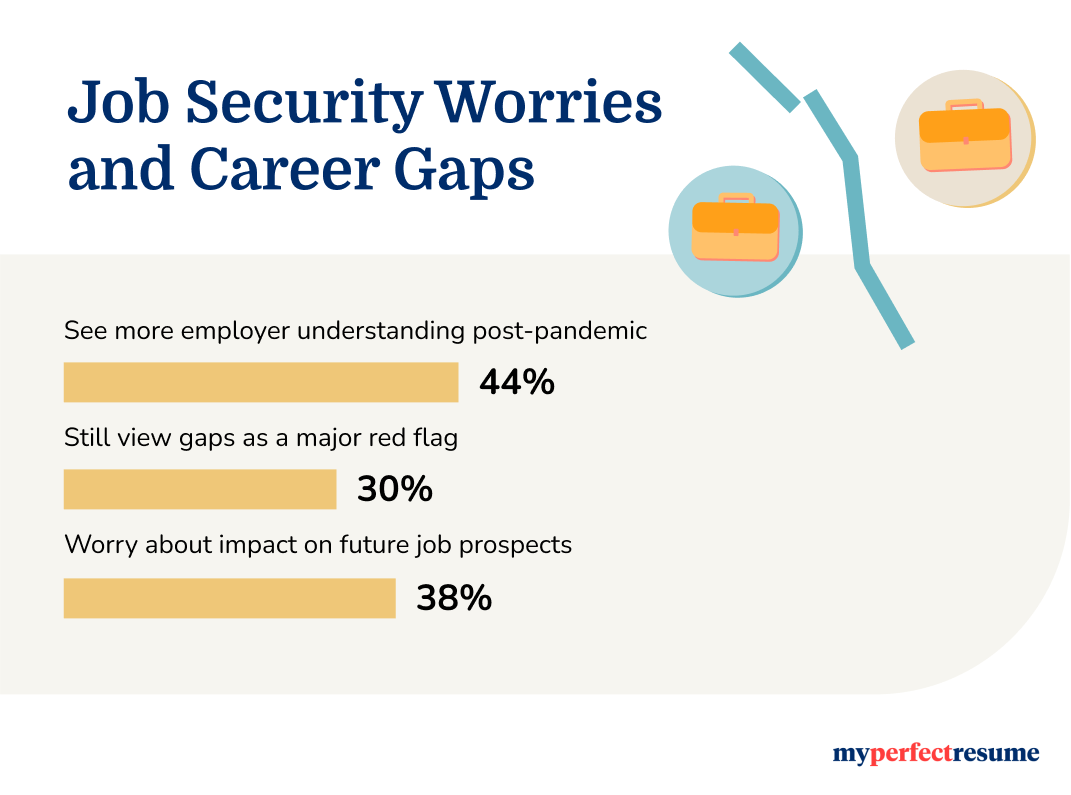Our customers have been hired at: *Foot Note
Table of Contents
Get started with MyPerfectResume today!
- Build a resume on any device
- Pick an ATS-friendly template
- Tailor with AI copy suggestions
In today’s fast-paced and ever-evolving job market, the traditional career path is no longer the only route to success. MyPerfectResume’s 2025 Career Gaps Report reveals that nearly half (47%) of U.S. workers have experienced a break in their careers.
While a growing number of employers appear more open to non-linear career histories, with 44% of respondents noting increased acceptance since the COVID-19 pandemic, a significant 30% still see these gaps as red flags.
This report dives into why career breaks are becoming more common, how employers perceive them, and what these trends mean for job security and future opportunities.
Key findings:
- Career gaps are common but still a concern: 47% of workers have taken a career break, and 38% worry about how it could impact future job prospects.
- Hiring stigma remains: 30% say employers still view career gaps negatively.
- Most job seekers avoid addressing gaps upfront: 64% prefer not to mention career gaps in applications, and only 20% address them in their cover letter or resume.
- Medical and caregiving leaves are most accepted: 75% say medical issues justify a career gap, followed by caregiving (69%) and education (65%).
- Risk of job insecurity: 22% believe taking medical or personal leave makes employees more vulnerable to layoffs or career setbacks.
Why Are Career Gaps More Common Today?
Career breaks stem from various factors as workers navigate personal and professional transitions. The report highlights several key reasons:
- Layoffs or company restructuring: 21%
- Career change or transitioning into a new field: 13%
- Caregiving responsibilities: 12%
- Burnout or mental health reasons: 12%
- Being fired without another job lined up: 12%
- Medical issues: 10%
- Other factors (e.g., relocating, military service): 6%
What it means: The diverse reasons behind career gaps show that these breaks are often driven by external circumstances and personal choices, not necessarily by a lack of capability or ambition. Recognizing this complexity is essential for both job seekers and employers.
Learn how to handle career gaps on your resume to enhance your application and stand out to potential employers.
Career Gaps Affecting Job Security
As career gaps become more normalized, concerns about job security and career progression still persist:
- 44% say employers are more understanding today compared to pre-pandemic years.
- However, 30% still feel employers consider career gaps a major red flag.
- 38% are highly concerned about how a career gap could affect their future job prospects.
See a visual representation of the above data:
What it means: While there is a growing acceptance of career gaps in the post-pandemic era, many workers still fear that these breaks could jeopardize their job security and career advancement due to persistent negative perceptions.
Are Career Gaps More Accepted Today?
The report reveals that while career breaks are increasingly common, workers still worry about employer perceptions. When asked about the most acceptable reasons for career gaps, employees ranked the following as the most justifiable:
- Medical issues (75%)
- Caregiving responsibilities (69%)
- Pursuing education (65%)
- Layoff or company restructuring (58%)
- Career change (50%)
- Burnout or mental health reasons (40%)
What it means: The report reveals that specific reasons for career gaps, particularly those related to health, caregiving, and education, are viewed as more justifiable. However, career changes and burnout due to a lack of job satisfaction still carry a stigma, indicating that acceptance of career gaps largely depends on the context behind them.
How Workers Navigate Career Gaps in Job Searches
When it comes to explaining career gaps, most workers are very cautious.
- The majority (64%) prefer to keep the career gap off their application altogether, discussing it only if hiring managers mention it or if it is necessary.
- Only 1 in 5 (20%) would address a gap in their application materials.
- 4% would actively hide or lie about their gap.
- The top concerns for people returning to the workforce are explaining a gap to hiring managers (38%) and finding employers willing to hire someone with a gap (37%).
What it means: Most workers' cautious approach to addressing career gaps shows an ongoing fear of negative judgment, even with the rise of skills-based hiring and acceptance of varied career paths. This reluctance reflects the challenge of finding employers who appreciate the diverse experiences that come with non-linear career paths.
The 2025 Career Gaps Report shows that while nearly half of U.S. workers have experienced career breaks, these gaps evoke mixed feelings among job seekers and employers.
On the one hand, gaps driven by health, caregiving, or educational pursuits are increasingly justifiable; on the other, concerns persist that these breaks may negatively impact job prospects and security.
Most workers downplay or omit their gaps during the hiring process, reflecting an ongoing apprehension about potential stigma.
For press inquiries, contact Nathan Barber at nathan.barber@bold.com.
Survey Methodology
The findings were obtained by surveying 1,000 U.S. workers on February 17, 2025. The Pollfish survey incorporated a mix of multiple-choice, scale-based, and open-ended questions designed to assess the prevalence of career gaps, the underlying reasons for these breaks, and their perceived impact on job security and hiring practices.
About MyPerfectResume
MyPerfectResume Resume Builder with professional templates is designed to help job seekers elevate their careers. The easy-to-use platform was created to eliminate the hassle of resume writing, offering professionally written examples, free expert tips, step-by-step guidance to make a resume, and valuable interview advice to create an outstanding job application effortlessly. Since 2012, MyPerfectResume's Resume Builder has helped more than 11 million job seekers create their perfect resumes online. Its comprehensive employment surveys have been featured in Forbes, Yahoo! Finance, CNBC, Newsweek, USA Today, BBC, Workable, and more. Stay connected with MyPerfectResume’s latest Facebook, LinkedIn, Instagram, X, and Pinterest updates.
Our customers have been hired at:*Foot Note











